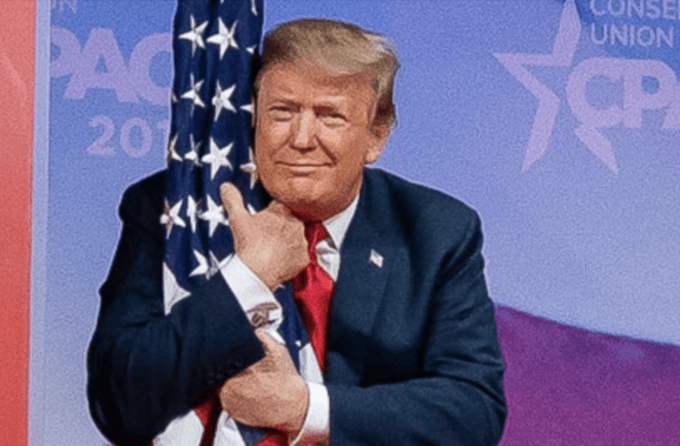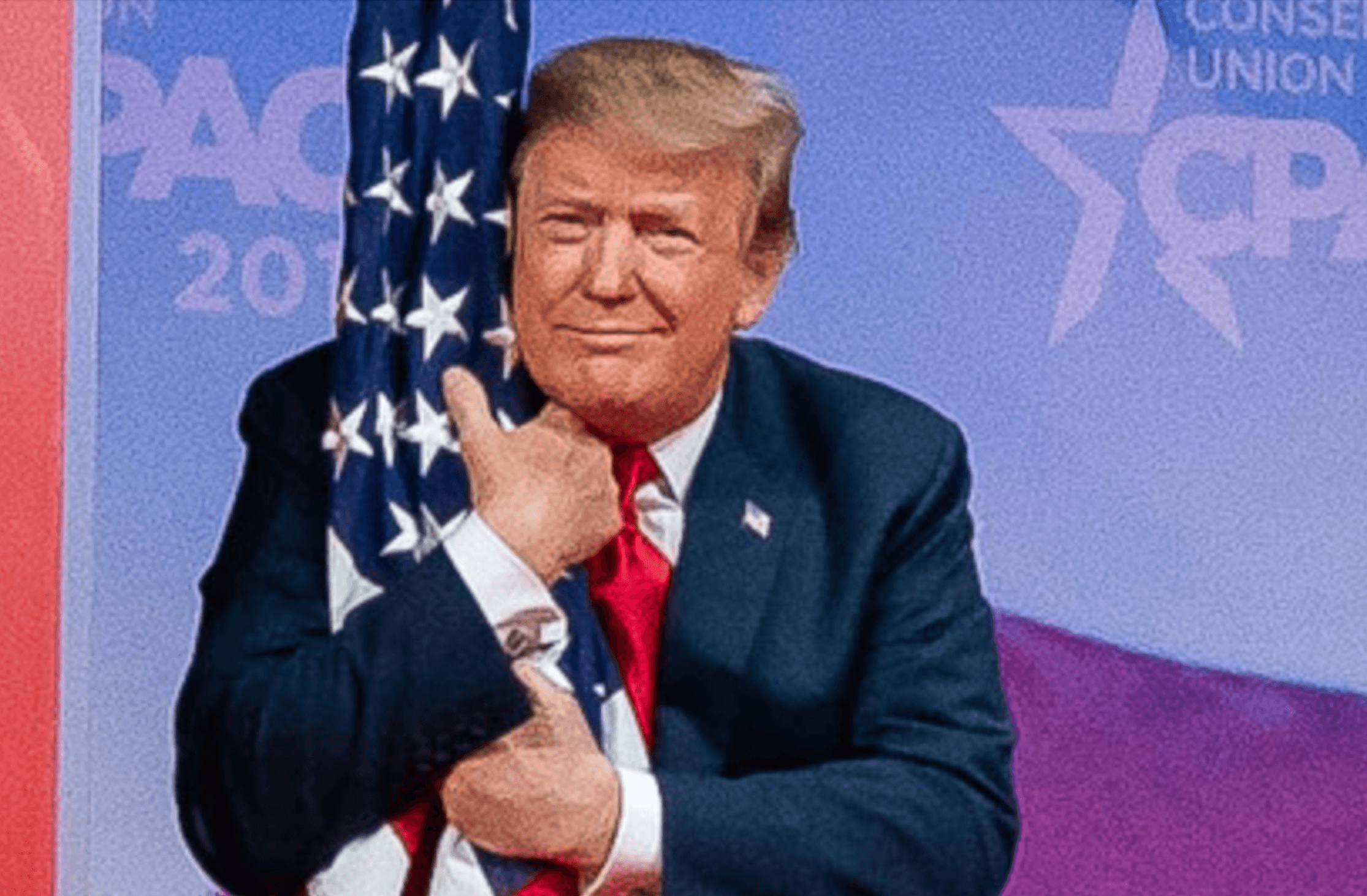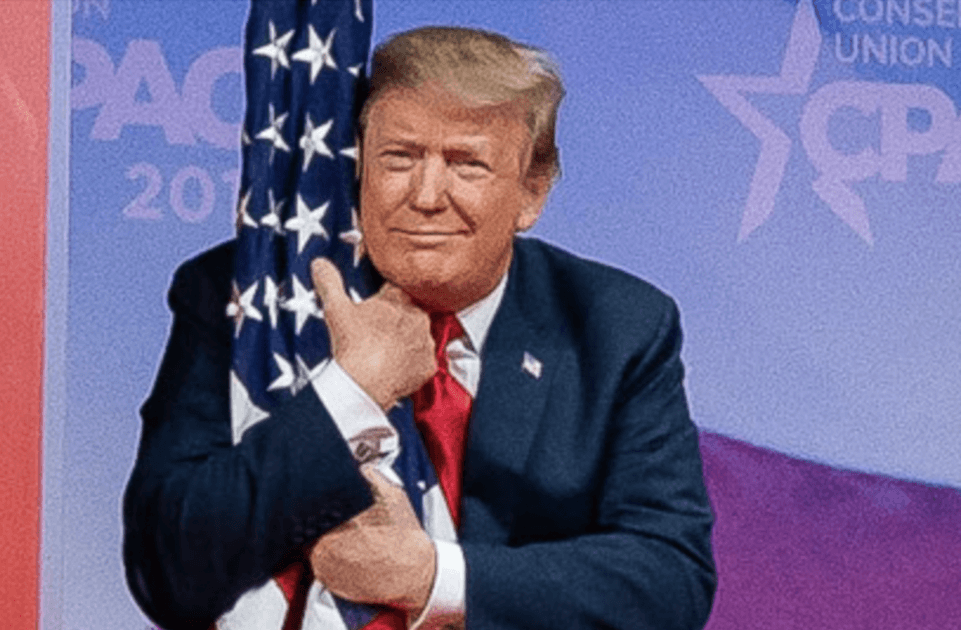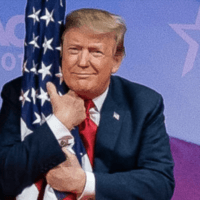






























































Photograph Source: The White House – Public Domain
The installation of the malevolent Trump regime has spawned endless analogies to Hitler, Nazi Germany, Mussolini. It has been pointed out that Trump is in thrall to Kim Jong-Un, North Korea’s strongman. Then there is the linkage to Vladimir Putin: Trump is under the sway—if not a direct employee—of the Russian dictator.
All of this is understandable–to an extent. Trump, at times, conveys the bearing of the stereotypical foreign potentate. A military parade on his birthday, for example, feels intrinsically foreign.
One flaw in this reasoning are the assumptions that Trump has a firm grasp on anything outside his narrow interests, which revolve around making lots of money, avenging himself for perceived slights, playing golf, and hot babes. His awareness of the outside world is extremely limited; his attention span is fleeting.
The larger issue, though, is that these constant comparisons to Hitler or Putin or Mussolini are inadvertent cop-outs: As if Trump is such an aberration that his pathology must originate from foreign sources. In reality, authoritarianism, viciousness, and violence are part and parcel of the American schema. As is censorship. And notions of racial superiority and inferiority—the purity of blood—have entrenched roots in the United States. When Trump spreads alarm that “illegals” are polluting the precious American bloodline, he is recycling an American trope. Hitler borrowed some of this from us.
If one is looking for Trump’s antecedents from the 1930s and 1940s, a more honest reckoning would be to basically disregard Hitler and Mussolini and devote some attention to, say, Theodore Bilbo, Mississippi’s arch-racist governor and senator from the 1920s to 1940s.
Bilbo inveighed against racial “mongrelization” and generated proposals to deport America’s African-American population to Africa. As governor, he “fired many faculty members of Mississippi’s colleges and universities and brought the state almost to bankruptcy.” (Britannica) That sounds awfully familiar. Bilbo’s career was mired in scandal and he became a famous synonym for racial intolerance—and earned the “clownish” appellation, which also sounds familiar. Bilbo is actually referenced in the 1947 film Gentleman’s Agreement—without explanation, which suggests the extent of his infamy. Infamous or not, though, the Honorable Theodore Bilbo—champion of racial purity and advocate for mass deportation—held high office in the Land of the Free.
Trump also bears some striking similarities—although not in demeanor and presentation—to George Wallace, who combined populist grievances with ugly racist tropes and leaped to prominence—and not just in the South.
There is a very real link from Joseph McCarthy to Trump —not just in the tactics of spreading baseless conspiracies and a gusto for ruining lives—but a flesh-and-blood link in the person of former McCarthy right-hand man Roy Cohn, one of Trump’s charming mentors.
Spiro Agnew, Richard Nixon’s first vice president, has faded from public memory, but at one point he was a household name. Agnew was a prime example of a frightening American archetype: the malevolent doofus. (Trump is the malevolent doofus par excellence.) Agnew launched a ferocious attack against the (supposed) elitist, biased press. He was full of pithy comments, like “if you’ve seen one city slum, you’ve seen them all” and referred to a Japanese-American reporter as a “fat Jap.”
There was Nixon himself. A meteoric political rise took him to the vice presidency at the uncommonly young age of thirty-nine, yet Nixon was perpetually aggrieved, complaining constantly about biased media coverage. He cast himself as the president of “law and order” and the spokesman for the “silent majority,” a fierce opponent of protestors, do-nothings, radicals, eggheads. And it was Nixon who—by means of what was deemed the “Southern strategy”—brought the Dixiecrat strain into the Republican fold.
Frank Rizzo, the repulsive mayor of Philadelphia in the 1970s—cited approvingly by Trump—also merits inclusion. Rizzo—at the time so notorious as to make an appearance in Doonesbury—promised to “make Attila the Hun look like a faggot,” inveighed against the press, and urged his supporters to “vote white.”
There is also a direct line from Ronald Reagan to Donald Trump that is more instructive than comparisons to Hitler or Putin. Reagan and Trump both came to prominence as entertainers, dispensers of carefully crafted media images.
Reagan spoke in code. When he referred to “welfare queens,” the inference was apparent: Chiselers and spongers—of a darker skin hue—were running rampant. When Reagan castigated government overreach, he meant civil rights legislation and social programs, not a bloated military and corporate welfare. Trump has upped the ante: He does not speak in code and his positions are more extreme than Reagan’s. But there is a real link.
The veneration of Ronald Reagan also speaks to a certain bizarre American mythos. Reagan, it was said, brought back a sorely needed blood and guts to American politics. He embodied the tall-in-the-saddle Western ethos. He reintroduced piety and those cherished American values. He brought class and elegance back to the White House. He was warm and avuncular, always with a ready quip. Leaving aside the blatant discrepancies—Reagan was a pampered movie star—no one person could embody all these different, contradictory traits.
And so it is with Trump, with even more hypocrisy: The New York City rich kid whose policies aid his fellow plutocrats is deeply in tune with the problems of the average American. The foul-mouthed rapist is a paragon of religious values. He is tough and resolute, although he has daily hissy fits. He has restored law and order, yet is also a badass, a gangster. He upholds tradition, yet is a disruptor. Like Reagan, these traits simply don’t add up in any one person.
And since Trump is more of a gross manifestation and not a person with normal human responses, it doesn’t seem like a stretch to offer comparisons to fictional characters. There has been mention of Buzz Windrip, malevolent doofus in Sinclair Lewis’s It Can’t Happen Here, and Lonesome Rhodes, hayseed demagogue (played by Andy Griffith) in the 1957 film A Face in the Crowd, based on a Budd Schulberg short story. There’s a good deal of Trump in the sniveling, vindictive—and incompetent– Frank Burns of M*A*S*H. Trump can be construed as the cannier, pathological version of Ted Baxter, the vain, dim-bulb anchorman on The Mary Tyler Moore Show. And Trump is an utterly fake Archie Bunker, but his viewpoints are the same: stupid, misinformed, brutal.
+++
Trump is also firmly ensconced in the tradition of proud, emphatic provincialism. A stock character in movies and television was the oddball foreigner, most often in a position of culture and intellect: classical musician, painter, chef, scientist. Psychologists were lampooned with a German accent. For real culture and intellectual rigor, one looked to Europe. We really didn’t need those strange people with their funny accents and weird food. This is source of some of the animus against non-Americans that so preoccupies Trump and his supporters. There’s no need for fancy-pants foreign graduate students or academics. There is nothing whatsoever to be gained by exposure to the outside world.
+++
None of this is meant to minimize the unprecedented danger we’re now facing. The lethal strands that contributed to the ascent of Donald Trump are not unprecedented, but the fact that they have all coalesced is a new, perilous phenomenon. Reagan and other malignant figures were worshipped, but it is the degree of worship and veneration for Donald Trump that is unprecedented. It is a perfect storm, a confluence of the baser elements in the American tradition, with flimsy democratic guardrails shunted aside.
When I read accounts of ICE snatching people off the street, my visceral response is that this is a totalitarian dystopia of some obscure foreign origin. When there are accusations that Haitians eat household pets, it does remind me of Nazi archetypes. But this is not dystopian fiction or Nazi Germany. It is an inevitable outgrowth of a distinctly American horror.
References to Walt Kelly’s Pogo comic strip, once very common, are hard to come by these days. The eponymous protagonist—an insightful possum–was once so famous as to run for president. “We have met the enemy,” Pogo opined in what became a famous catchphrase, “and he is us.”
The post The All-American Boy appeared first on CounterPunch.org.
This post was originally published on CounterPunch.org.